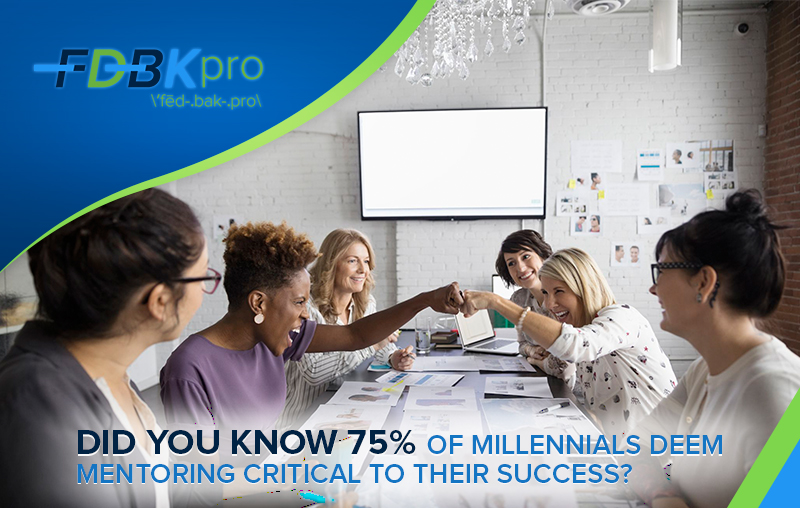Everyone talks about mentoring. But it hasn’t really become a mainstream plan of action adopted by companies globally. Thankfully, we can now see a slow change in tide.
Let’s look at the forces of change that are at play here.
The culture of work that we were so comfortable with has changed completely.
While money continues to be a motivator, opportunities for growth seem to be the new big currency. The growing millennial population in the workforce is one of the primary reasons for this shift. By 2025, millennials will constitute 75% of the entire workforce. And for this generation, mentoring is a key factor that boosts engagement at work.
The Millennials Are Here
Research shows that Millennials are twice as likely to look for a mentor than others. 81% of millennials are willing to be committed to their employers if they feel they get a positive result out of the company mentorship program.
Why do these numbers matter? We shall let statistics answer this as well. According to a Deloitte survey, “One in four Millennials would quit his or her current employer to join a new organization or to do something different.” The survey further propounds that only 16 percent of Millennials see themselves with their current employers a decade from now, while 63% of the millennials say their “leadership skills are not being fully developed.”
And if you feel that this millennial equation is not compelling enough to warrant a mentoring consideration, how’s this as food for thought:
- Organizations that embrace mentoring are rewarded with higher degrees of engagement, retention, and knowledge sharing.
- 71% of Fortune 500 companies offer focused mentoring programs to their employees
Are you engaging your High-Potential employees?
When discussing the change in the nature of work, we have to talk about the rise of the importance of high-potential employees. They are high contributors and deliver the most value to the organization. They are considered high potential because of their perceived talent and contribution and not on their rank.
With talent shortage becoming a real problem for companies, engaging high-potential employees has become critical for organizations. Almost 50% to 70% of organizations feel they are negatively impacted because of the shortage of qualified leaders.
Talent Management Challenges
It is a no-brainer that talent management has to make a strategic shift and leverage mentoring in a more deliberate and organized manner to assuage these obvious challenges:
- Poor workplace engagement, especially amongst Millennials, Women Leaders, and Gen-Z Professionals, owing to the disinterest of managers and poor mentoring support.
- Low productivity and high attrition rates because of a lack of trust and support for career growth.
- CXO’s battling with making employees more goal-oriented, having result-driven leadership programs, improving retention and employee engagement, and creating a positive and nurturing work environment.
How Mentoring Works Currently
All along mentoring has been using the ‘gut-feel’ barometer to identify which employee needs what kind of support. However, as workplace dynamics change, this method becomes highly unreliable and often redundant.
Are you managing the development needs of your high-profile employees based on guesswork? Is your plan to nurture your valuable employees based on an archaic calendar only because ‘it’s worked for so long?’
If so, you won’t be able to create engagement at work or deliver value to your high-profile employees on a long-term basis. In today’s day where being data-driven is the key to success, how can mentoring be any different?
Do you need a robust mentoring platform? and here’s what it is supposed to deliver
Your mentoring program needs a 21st-century makeover − and the key component of this makeover is data.
Your High-Potential Talent Programs should nurture the next generation of leaders by focusing on competencies that really matter. Your mentorship program has to be more deliberate, organized, personalized, relevant, and measurable. Only then can you deliver value to your employees (especially the high-value ones) and drive productivity and engagement.
AI and Machine Learning to the rescue
Companies need an enterprise mentoring platform like NumlyEngage™ Enterprise that uses intelligent technologies such as machine learning and AI to identify patterns, capture, and analyze data based on self-assessment and mentor feedback and then tailor AI-nudges and coaching recommendations.
NumlyEngage™ Enterprise has a robust repository of assets such as a comprehensive database of skills and competencies, feedback questions that are mapped to key skills and competencies along with a comprehensive database of coaching tips mapped to these key skills.
To make mentoring outcomes positive, the platform uses personality factor user self-assessments, machine-learning enabled recommendations based on self-assessment scores, and skill level data processing capabilities.
In 2006 Sun Microsystems released the results of a study conducted by Gartner that used statistical analysis to examine the financial impact of mentoring. This study revealed that “mentoring has a positive impact on mentors and mentees, producing employees that are more highly valued by the business.?”
Clearly, organizations stand to gain a lot by mentoring their employees. By using a data-driven platform to support their mentoring initiatives, organizations can make sure that all such efforts lead to positive outcomes. If you want that for your organization, connect with us today at www.numly.io to see how the NumlyEngage™ Enterprise can transform your mentorship programs.

